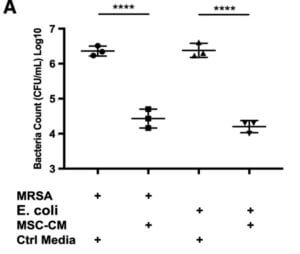
Stem cells as antimicrobials?

Mesenchymal stem cells release antimicrobial factors that enhance the activity of traditional antibiotics. Could systemic delivery of mesenchymal stem cells be the way to treat chronic drug-resistant infections in the future?
Rise of the superbugs
Antimicrobial resistance describes a situation where bacteria and viruses have adapted and evolved to resist the drugs designed to kill them. According to a study commissioned by the Public Health Agency of Canada, these superbugs will likely kill 400, 000 Canadians and cost the economy over $400 billion over the next 30 years.
We are no longer in the “golden years” of antibiotics when antimicrobial drugs were the primary method used to combat infections. So, how can we handle the rise of the superbugs?
How about using stem cells as an alternative? Researchers in this study investigated exactly that using stem cells to battle chronic infections.
Antimicrobial properties of stem cells
 Previous studies indicate that mesenchymal stem cells (MSCs) have immunological properties. For example, they release signaling molecules that recruit cells in the immune system responsible for killing foreign pathogens to specific areas of the body. MSCs also make antimicrobial peptides. The body uses these peptides as a first line of defense to kill microbes like bacteria, viruses and yeast.
Previous studies indicate that mesenchymal stem cells (MSCs) have immunological properties. For example, they release signaling molecules that recruit cells in the immune system responsible for killing foreign pathogens to specific areas of the body. MSCs also make antimicrobial peptides. The body uses these peptides as a first line of defense to kill microbes like bacteria, viruses and yeast.
Other studies involving mice show that MSCs can lower the death rate associated with infections and enhance the activity of antibiotics used to treat certain diseases. These researchers have previously demonstrated that the systematic delivery of MSCs was even more effective when combined with traditional antibiotics.
Their current study builds on these previous findings by looking at one specific superbug, MRSA (Methicillin-resistant Staphylococcus aureus), responsible for many chronic infections and deaths around the world.
MSCs enhance the activity of antibiotics
Researchers found that MSCs from bone marrow had bactericidal properties and were able to enhance the effects of antibiotics. Bacterial cells exposed to MSCs grew much slower compared to those that were not. When used together, MSCs and antibacterial drugs like vancomycin were much more effective at killing bacterial cells than drugs alone.
The next set of experiments looked at if stem cells released peptides useful for immunity. Indeed, MSCs released peptides used by the body as a first line of defense to activate the immune system, which ultimately resulted in the rapid death of bacterial cells.
Finally, they highlighted using a mouse model that MSCs decease the bacterial burden and promote faster wound healing.
Stem cells as an alternative
Antibiotic resistance is considered a global crisis, so findings from this study offer new hope for the future. Patients with chronic infections will be treated with antibiotics and MSC infusions to tackle superbugs more effectively. Could it be that stem cells may offer an alternative way to combat superbugs resistant to antibiotics in the future?
Reference
Chow, L, Johnson, V, Impastato, R. et al. (2019) Antibacterial activity of human mesenchymal stem cells mediated directly by constitutively secreted factors and indirectly by activation of innate immune effector cells. STEM CELLS Transl Med. 2020;9:235–249. doi: 10.1002/sctm.19-0092.


The hospital bag checklist

Sibling cord blood tested for treating cerebral palsy in young children


Categories
Related Posts

Top 10 items to include in your baby registry

The hospital bag checklist

Sibling cord blood tested for treating cerebral palsy in young children





